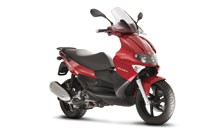Many dealers see two-wheelers as a specialised market and are therefore wary of selling them.
The margins are smaller, but motorcycles are cheaper to buy than cars and offer huge upsell opportunities such as clothing and accessories.
Despite the latest registration figures from the Motor-cycle Industry Association (MCIA) showing registrations fell 26% in February compared to the same time last year, they can still be an attractive business proposition.
Fred Stevens, network development manager at Piaggio, says it is talking to 10 car dealers and wants to appoint 30 franchisees this year.
“We are getting quite a lot of interest from car dealers because of the low new car sales. A lot of people are getting rid of second cars and buying two-wheelers,” he adds.
Steve Cooper, Triumph’s UK dealer development manager, says car dealers have the advantage of knowing the broader requirements of the business and they understand it is not just based on sales.
Cooper says: “It is worth dealers selling bikes if they are passionate bikers and good business people.
“It is not a silver bullet to turn around a flagging car business, but if they have passion they should make a success of it.”
MCIA spokesman Simon Small says the recent increase in motorcycle tests could be down to drivers looking for ways to reduce commuting costs.
He says: “It would cost little in fuel, be exempt from the congestion charge and, in most cases, be free to park.”
DVLA data shows that 3.8 million people in the UK have motorcycle entitlement on their licence.
Generally, motorcyclists fall into two categories – those who ride for pleasure and others who use their two-wheeler for commuting.
Key for any prospective dealer is to understand which it is dealing with.
Adding a scooter franchise could bring other benefits.
Teenagers buying one could become car buyers in the near future and will probably bring their parents to the dealership.
Dealers' views
Initial investment and margins vary depending on the motorcycle franchise.
A 7% margin or £50 profit per scooter is not uncommon, along with a £35-50,000 start up cost.
Ten scooters could be bought for about £10,000 and there are a huge amount of upselling opportunities.
Brindley Honda in Wolverhampton started selling motorcycles for the first time two weeks ago after moving to larger premises in Wolverhampton.
Terry Butcher, dealer principal, says: “We have a good relationship with Honda and thought motorcycles would be a good expansion to the business.
“We thought we could offer the whole Honda range after we had people buying cars who wanted to know about the bikes because they were bikers as well.
“It is a more emotive purchase for most people because it is a hobby. You have to understand people are buying a bike for different reasons to a car.”
His research involved speaking to people in the car and motorcycle industry and visiting motorcycle dealers where he found there was a different ethos compared to cars.
He discovered that motorcyclists have knowledge of the product and expect sales staff to be equally as passionate and enthusiastic about them.
For car dealers diversifying into the two-wheeler market, it makes sense to headhunt dedicated personnel.
Butcher’s sales manager is a former motorcycle dealer. A clothing specialist has also been employed.
Butcher says: “Some of the clothing is quite specialised. It is not like selling a jacket at a shop.
"You need to now how it’s made, what it will do and the protection it offers.
“We also have security items like locks, chains and alarms so it’s like running a shop alongside the bikes.”
Colin Appleyard Group began selling motorcycles in 1971 and added cars in 1979. It now operates four Suzuki car and two Yamaha and Suzuki motorcycle franchises.
Robin Appleyard, managing director, keeps the motorcycles separate from cars because of the different retail cultures.
He believes motor-cyclists have “phenomenal” knowledge of the products and expect sales staff to be motor-cycle enthusiasts as well.
“To sell motorcycles successfully, you almost become a friend of the customer and are on first-name terms, he says.
“The motorcyclist will come into the dealership after work or at weekends because it is a leisure purchase.
“In some cases, I have had people change their bike four times a year.”
The company also arranges motor-cycle training for customers via two independent companies.
A ride out from their Keighley dealership organised by one of the salesman every Wednesday helps attract more custom and promote the business.
The salesman buys refreshments for those who attend, the cost being recouped through additional sales.
Duncan Johnston, network development manager for Honda Motorcycles, says it is vital that car dealers understand the market before taking on a motorcycle franchise.
Johnston says: “A car dealer cannot expect to put bikes in the showroom and for people to come and see them.
“The first question we would ask is who is running the dealership and what do they know about motorcycles. It’s a different sales environment.
“A good dealership will have the right atmosphere because it will be full of like-minded people.”














Login to comment
Comments
No comments have been made yet.